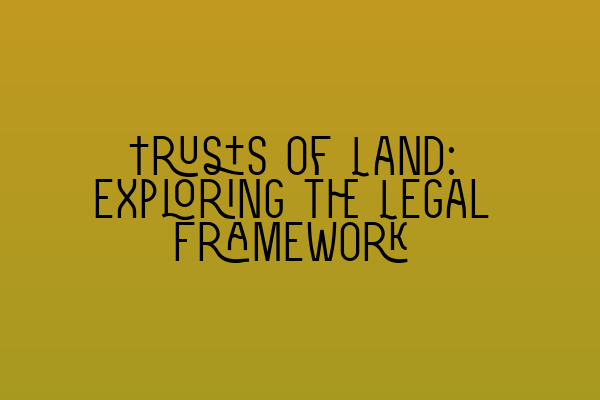Trusts of Land: Exploring the Legal Framework
Welcome to the blog of SQE Property Law & Land Law, your trusted solicitors in matters relating to property law and land law. Today, we will be exploring the legal framework surrounding trusts of land. Whether you are a law student preparing for the SQE exams or a practitioner in this field, this article aims to provide you with a comprehensive understanding of trusts of land.
Before delving into the intricacies of trusts of land, let us first define what a trust is. A trust is a legal relationship in which one party, known as the trustee, holds assets on behalf of another party, known as the beneficiary. Trusts play a crucial role in property law, particularly in the context of land ownership and management.
In the United Kingdom, trusts of land are primarily governed by the Trusts of Land and Appointment of Trustees Act 1996 (ToLATA). This legislation sets out the legal framework for co-owning property, as well as the rights and responsibilities of the co-owners.
One of the key aspects of trusts of land is the concept of an equitable interest. An equitable interest is a right or claim that a person has in a property, which is recognized and protected by equity rather than by common law. In the context of trusts of land, equitable interests determine the ownership rights and obligations of the co-owners.
In a trust of land, the legal title is held by the trustees, while the equitable interests are held by the beneficiaries. The trustees have a duty to manage the property in the best interests of the beneficiaries and in accordance with the terms of the trust. This duty includes maintaining the property, collecting rent, and making decisions regarding the property.
There are two types of trusts of land: express trusts and implied trusts. Express trusts are created when the co-owners explicitly declare their intention to hold the property on trust. This can be done through a written document, such as a trust deed, or by oral agreement. On the other hand, implied trusts arise when the co-owners’ conduct or circumstances indicate an intention to hold the property on trust.
In addition to the legal framework provided by ToLATA, case law also plays a significant role in shaping the principles and rules surrounding trusts of land. Courts have established several key principles, such as the presumption of joint beneficial ownership for cohabiting couples, and the concept of the beneficial interests being proportionate to the contributions made by the co-owners.
Understanding trusts of land is crucial for anyone involved in property law, as it provides the legal basis for resolving disputes and managing co-owned properties. Whether you are a solicitor, law student, or property owner, a thorough comprehension of trusts of land will enhance your ability to advise clients or make informed decisions.
At SQE Property Law & Land Law, we offer comprehensive preparation courses for the SQE exams, including both SQE 1 and SQE 2. Our courses cover all the relevant topics, including trusts of land, to ensure you are well-prepared for the exams. Check out our SQE 1 Practice Exam Questions and SQE 2 Preparation Courses articles for more information.
In conclusion, trusts of land form an essential part of property law and are governed by the Trusts of Land and Appointment of Trustees Act 1996. Equitable interests, which determine the rights and obligations of co-owners, play a vital role in this legal framework. Express trusts and implied trusts are the two main types of trusts of land, with case law further shaping the principles and rules surrounding them. We hope this article has provided you with a better understanding of trusts of land and their significance in property law.
For more information about the SQE exams and their preparation, take a look at our SQE 1 Preparation Courses and SRA SQE Exam Dates articles. If you have any specific queries or require legal advice regarding trusts of land or any other property law matter, do not hesitate to contact us at SQE Property Law & Land Law. Our team of expert solicitors is here to assist you.
Remember, a solid understanding of trusts of land is key to success in the field of property law. Stay tuned to our blog for more informative articles on various aspects of property law and land law.
